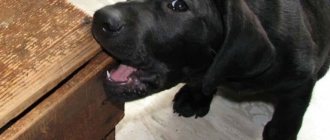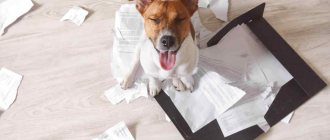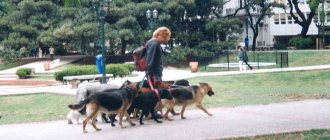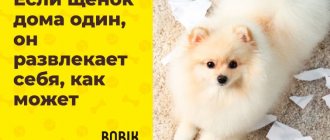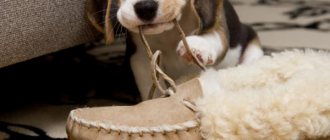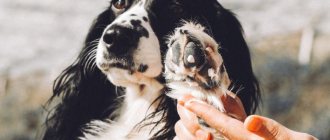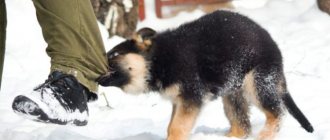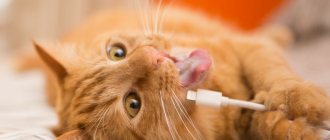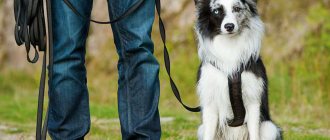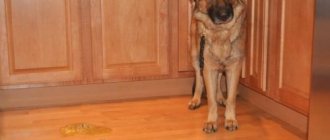Preventing this behavior
Don't let your dog feel sad and lonely. That's why the puppy's house should not be in the far corner of the house. He will feel lonely there. Its corner should be fenced, but not isolated, so that it is convenient to observe what is happening in the house.
Also be sure to walk with the animal. The number of walks should be at least 2 times a day - for an adult dog, 4-5 times a day for a puppy.
If your puppy is chewing on your shoes, it is most likely due to changing teeth. Your pet must know the “no” command. But an alternative should be offered: this is “not possible”, and this is “possible”. Buy toys for your puppy to sharpen his teeth: chewing bones, elastic balls. Tie the toy to the door handle. The animal will be interested in picking up the “prey,” dragging it to a secluded corner and “figuring it out” there.
Another reason could be stomach diseases, especially if it is an adult dog and has never had the desire to chew shoes before. In this case, you should contact your veterinarian.
If you find already damaged shoes, then there is no point in scolding your pet. The animal has a very short memory: after half an hour the pet will forget about what it did.
If you catch your pet in the act, then under no circumstances should you hit or scream at the animal. Just strictly say “no.” Take away from him what he was gnawing on and send him to his place. The dog must understand what it did wrong.
Why a dog chews shoes: main reasons
Statistics show that problems with chewing shoes and damaging the owner’s personal property are the most common reasons for owners’ disappointment in their pets. Thousands of owners around the world turn to dog trainers and experienced “colleagues” every day for advice.
The problem is that the owner does not take into account the fact that the dog never spoils things for nothing.
Note! Any destructive chewing in the home is undesirable.
Even if the dog does not ruin your shoes, but often chews other things, the weaning methods are similar. Preserving shoes becomes more difficult because they retain the owner's scent for a long time.
Dogs must chew inedible objects and there are many reasons for this:
- Puppies chew shoes when they experience discomfort during the eruption of their molars.
- An adult dog may be attracted to the smell of shoes.
- No objects or toys that can be chewed.
- Older, well-behaved dogs may occasionally ruin your shoes to exercise their gums and remove plaque.
If you really want to stop your dog from chewing your shoes, punishing him for it, much less yelling at him, is useless. Behavior correction should take place in a calm environment, because the more excited the dog is, the more likely it is to ruin your things again.
Many inexperienced owners believe that the puppy must be severely punished and he will not touch shoes again . Statistics suggest that this method works in 15% of cases. In 85% of cases, the dog continues to chew shoes, but in the absence of the owner.
To effectively combat unwanted behavior, it is necessary to determine its cause. Experience shows that shoe chewing is most often associated with:
- Boredom – When a puppy or adult dog has nothing to do, it can (and most likely will) destroy everything around it.
- The downside to physical activity is that chewing takes a lot of time and energy, especially in puppies. Finding shoes and getting them off the shelf requires some ingenuity. Simply put, if you don't exercise your dog, he will find something to do on his own, even if he knows you won't like it.
- Stress and anxiety or disappointment and pangs of conscience - the smell of the owner helps to feel calmer, in addition, chewing is a fascinating process that allows you to distract yourself.
- The disadvantage of communicating with the owner is that the dog can chew your shoes, things and even underwear, just because it craves communication. When you come home and punish your pet, the dog will receive it. This is a very subtle point in educational work, which is important to identify and correct in time. Otherwise, the dog will be in constant stress and spoil your things more often.
To identify the true cause of unwanted behavior, analyze:
- How often does your dog get physical and mental stimulation? If the load is not enough, the reason for the bad behavior is obvious.
- Does your dog get tired during walks? Some dog breeds need very serious exercise.
- Does your dog chew your shoes in your presence? If not, the reason is boredom and lack of communication.
- Does your pet have enough toys to chew?
- Is shoe chewing associated with teething (in puppies), toothache (in adult dogs), or tartar (in older dogs)?
In order not to provoke your ward into unwanted actions while he is still a puppy, it is advisable to put your things in an inaccessible place immediately after arriving home. For most puppies, easy obstacles are enough for them to give up searching for shoes and turn their attention to toys that can be chewed.
Important! Carefully examine your dog's mouth to see if he is chewing on shoes to relieve discomfort associated with his gums or teeth. If you do not have the experience to determine possible problems in the oral cavity, it is better to consult a veterinarian.
Remove your shoes
The easiest way to protect your item of clothing is to limit your dog's access to your shoes. Shoes can be placed in a closet, and special fasteners can be placed on the closets. After this, the animal will not be able to open and climb into the closet on its own.
Then place dog toys around the room. This method makes it clear to the dog, not that “you can’t chew,” but that the animal “can chew” certain objects that allow it.
Another method is to limit the pet’s freedom of movement around the apartment. When the dog is alone, it can be locked in the room, but not in the bathroom or toilet. This way she won't have the opportunity to chew on the shoes. But also make sure that your dog doesn’t get bored: leave toys for him in the room.
Weaning a puppy from chewing shoes
When you discover your first damaged pair of shoes, don’t rush to start correcting your behavior. To be successful, you need to learn all aspects related to your pet's destructive chewing. Some dogs only chew shoes at night when the owner is sleeping. To attract attention, your dog may chew your shoes in your presence. To cope with boredom and anxiety, the puppy will destroy shoes when no one is home.
As soon as the puppy appears in the house, you should have at least 10 durable toys that the baby can chew. It is important to constantly maintain your pet’s interest in toys, so they are constantly replaced. Restock toys once or twice a month to make swapping more frequent and fun.
In some cases, dogs will ignore legal chew toys simply because they don't like the taste of the shoes. Most often, this addiction is associated with the presence of leather shoes in the house. To process raw materials, tannins are used, which lead to numbness of the gums.
Your puppy may have started chewing shoes for the first time due to discomfort associated with teething. Having stumbled upon leather shoes, he will remember for a long time that they have a special taste. Moreover, the dog will chew more and more new shoes in order to find a “treat” with an unusual taste. To eliminate your dog's craving for tannins, it is enough to provide him with chewable treats.
Practicing the “Fu” command
From the first days of living in a new home, the puppy must be taught the “fu” command. To practice this shoe command, place a shoe in the middle of the room and watch it. As soon as the puppy approaches the shoes, sternly say ugh.
If the puppy does not react and begins to chew on the shoe, silently take him by the collar and lead him to his place. When the puppy is on the bed, tease him with the toy for a few seconds and praise him when the baby begins to chew it. If the dog moves away from the shoes after the command, it must be generously praised.
It is important to practice the “fu” command when the puppy does not understand that he is being watched. You can watch your pet through a crack in the door or install a web camera and monitor your pet from the next room.
You will be surprised how difficult it will be for a puppy to overcome his desire. If the dog has learned the command, left alone with the shoe, it will approach it several times, try to take it in its mouth and move away again.
Observe your pet until he begins to chew the shoe or becomes distracted. If destructive desires take over, quickly return to the room, give the command “fu” and take the puppy to its place by the collar.
If the dog coped with its desires and did not chew the shoes, do not give special significance to the event! The puppy did not do anything supernatural - he behaved correctly, and this is normal.
Distraction method
When you return from a walk, do not let your dog off the leash until you take off your shoes and put them in an inaccessible place. Let the puppy see where you put the shoes! As soon as the shoes are hidden, immediately take the dog to wash his paws, and then play.
Take your puppy by the leash every time guests come to the house. Ask guests to put their shoes out of your pet's reach, but allow your pet to observe the process. If the dog behaves absolutely calmly and does not try to get into the closet, reward it with a treat. If the puppy intends to get to the shoes, distract him with toys.
If you don't remove your shoes and the puppy starts chewing them, restrain yourself and don't swear. Calmly approach the dog, offer it a toy or treat, and as soon as the puppy is distracted from the shoes, put them out of reach.
Note! Until a puppy is six months old, it is normal for a puppy to “attack” your shoes.
It usually takes several weeks for a puppy to completely wean himself from chewing shoes.
Traps and education
Another method is to set traps. For example, if your pet takes shoes out of the closet on his own, use a surprise effect. As soon as the animal tries to open the cabinet, use a clapper or whistle. Dogs do not really like such surprises and after several such attempts they will probably cease to be interested in the closet.
If your adult dog just can’t give up the habit of chewing shoes, then we recommend using the following tips from a dog trainer.
We put on a muzzle
The very first way to prevent the ability to chew is to wear a muzzle. The muzzle should be made of soft leather. Wear and remove the muzzle periodically for 3-4 weeks. Then the pet will wean itself off the bad habit.
Place in an aviary or cage
This is the most extreme measure. In case the muzzle doesn't stop the spoiler. For example, if an animal, in addition to shoes, damages switches or sockets.
In order for the dog to wean himself from spoiling things, he should be placed in an enclosure with a toy placed in advance. Your pet will learn to stop playing with your things and will focus only on its toy.
Parenting check
After you have used both recommendations, we advise you to give your pet freedom of action: without a muzzle and outside the cage. The owner leaves the pet alone at home for a short time, for 10-15 minutes. If after this time the things are intact, the animal is “rewarded” (with treats, games, walking) or “punished” (sent away, attempts to play together are ignored).
Then we “forgive” the offender and “free” the animal from the muzzle for a couple of hours.
Test
After the dog, remaining for short periods without a muzzle, understands that chewing shoes is not allowed, a “provocation” should be done. Leave your pet alone for 3-4 hours. To prevent your animal from getting bored, make sure in advance that he has everything he needs: walk him, feed him, give him a toy.
If the dog completed the task, praise it; if not, punish it.
Exam
This will be the very last check for your animal. Leave your dog alone at home all day. Place your shoes in a visible place in advance - bait. If the animal does not damage the “bait”, praise it. The retraining was completed successfully. If your pet ruins his shoes, punish him. Continue training.
Despite the above tips, you should remember that the key to your pet’s good behavior is proper care for its physiological and psycho-emotional needs. And if necessary, contact specialists in a timely manner.
- Author: Elena Romanenko
Rate this article:
- 5
- 4
- 3
- 2
- 1
(3 votes, average: 2.3 out of 5)
Share with your friends!
Video “How to stop a dog from chewing things”
In this video you will learn why dogs chew things in the house and how to wean them from it.
We have figured out the reasons that provoke non-standard gastronomic tastes and problematic behavior. Now you need to understand how to stop your dog from chewing wires, furniture, shoes, household items, food waste and other inedible items.
Experienced breeders offer several of the most popular measures aimed at solving this problem.
According to breeders of purebred dogs, most often the dog damages property due to boredom and unspent energy. For this reason, it is recommended to review your pet’s daily routine, increase the duration of walks in the fresh air, and add active games, physical activity and sports.
A dog that has run around enough will not chew anything in the house. Play with your pet more often, educate and train it.
Punish wisely
One of the main mistakes novice dog breeders make is incorrect punishment. If you catch a dog at the scene of a crime, you can shame your pet for ruining something. However, you cannot punish an animal for an offense that has already been committed.
You also need to know how to punish correctly. Thus, a puppy caught eating shoes or wires should be lightly “patted” at the withers and reprimanded. This educational method cannot be used in relation to adult dogs, since such a procedure is considered humiliating for them.
New toys
If you don’t know how to stop a dog from chewing wallpaper and furniture, then keep in mind that animals are like children who are always happy with their favorite or new toy. Change toys periodically, and your pet will always know what to do. You can also give a previously hidden toy that will cause delight and a desire to frolic.
Special sprays
Some owners, not knowing how to wean their pet dog from destroying everything in the house, resort to using special sprays. These drugs are not dangerous to the health and life of animals and people.
The spray contains synthetic pepper. Having tasted a spray-treated rag or slipper, it is unlikely that the dog will want to repeat his prank. It is sometimes possible to eradicate the habit of eating everything in a row in 2-3 weeks.
Traditional methods
Did your animal chew on wires or furniture? Have you tried many methods, but don’t understand why you can’t stop your dog from ruining things in the house? Try using folk remedies that have proven themselves to be positive.
Some dog breeders advise weaning your dog from chewing everything using the noise method. Metal screws, nuts and bolts are poured into a plastic bottle. As soon as the dog was caught in the act of swallowing a foreign object, he can be scared with such a rattle.
Feeling bored or sad?
The most common reason why four-legged friends take your things or shoes into their bed, or simply gnaw them in the place where they took them, is the feeling of boredom, loneliness or strong longing for the owner. Most often, this behavior develops when the dog is left alone at home for a long time and is bored, or it is unusual for it, because before the owner was always nearby. The animal begins to look for the owner’s scent and the easiest way to smell it is from shoes, underwear and other personal belongings and items that are used most often. This is how the dog subconsciously calms itself down and gets rid of the feeling of loneliness by smelling a person.
If your four-legged friend has become simply bored (this can happen if you don’t purchase one), then by taking people’s things, he can simply occupy his free time in this way. As a rule, due to boredom, an animal not only carries a person’s things, but also begins to chew them. For this reason, it is important to start early in puppyhood to break the habit of always taking the owner's things while family members are away from home.
Another common reason why animals actively steal their owner’s things is unspent energy. Any dog is an active predator; it needs to move a lot so as not to experience discomfort or... If she often remains at home alone and does not have the opportunity to play properly, then she splashes out the accumulated strength only by “hunting” the owner’s shoes or personal belongings, and then deservedly gnaws on her prey or takes it to her personal corner in as a trophy.
How to stop a dog from picking up things
To prevent your pet from spoiling things or having to look for them around the apartment later, you need to not raise this issue. Before leaving your dog alone at home for a long time, give him a good walk with the opportunity to run, play and throw out pent-up energy. Then, left alone, she will most likely sleep soundly and regain strength. You should also always leave at least a little space for the animal to move around in the house - do not lock the dog in a small room. This does not put pressure on the animal’s psyche and does not make it feel disadvantaged and vulnerable, because because of this, many dogs also chew the owner’s shoes or socks - they simply relieve stress in this way.
If you notice that your dog is anxious and afraid to be left alone at home, you can try leaving the TV or radio on quietly. They create the effect of a person’s presence in the house and interrupt the silence that frightens the dog. Just make sure that the wires and antennas are not within the reach of the animal - he can chew them.
As for training, you only need to scold your pet at the moment when you directly catch him trying to take your things from their usual place. If you only see the moment when your shoes or socks are already in the dog’s bed, you need to demonstratively pick them up and take them to their place.
What to do if an adult dog chews your shoes?
As a rule, if an adult dog chews something, there are two reasons: boredom or stress.
In the first case, the dog tries to occupy itself in this way, and in the second, it tries to calm down (chewing calms dogs).
There is also a hypothesis that swallowing inedible objects (including chewed off fragments of shoes) is associated with diseases of the gastrointestinal tract
, and if a dog swallows inedible objects, then a veterinarian’s consultation is necessary.
Some take the path that seems easiest to them - punish the dog. However, punishment in itself cannot satisfy the need, and therefore does not solve the problem in any way. It just makes it worse, plunging the animal into even more stress.
So don’t give in to the temptation to hit your dog in the face with a slipper or poke it in damaged shoes - it won’t help.
Such behavior is a symptom of the dog’s troubles, and we need to work with the cause of the problem, not the symptom.
.
Accordingly, your task is to understand what need the dog satisfies and offer an alternative method acceptable to everyone.
. To do this, you need to analyze whether any of the five freedoms have been violated, and if so, how you can improve your pet’s life so that he does not have to entertain or console himself by damaging your property.
If you cannot solve the problem yourself, you may need to consult a specialist.
.
Pets can sometimes be incredibly annoying with their stupid antics. One of them - when a dog chews shoes - hits not only the nerves, but also the owner’s pocket.
The dog's hooliganism greatly harms the trusting relationship between him and his household. And the habit of “testing” everything that comes along is unsafe for your pet. If you do not eradicate it, electrical wiring, disinfectant, or a box of medicine may end up in the animal’s teeth.
Practicing the “Fu” command
From the first days of living in a new home, the puppy must be taught the “fu” command. To practice this shoe command, place a shoe in the middle of the room and watch it. As soon as the puppy approaches the shoes, sternly say ugh.
If the puppy does not react and begins to chew on the shoe, silently take him by the collar and lead him to his place. When the puppy is on the bed, tease him with the toy for a few seconds and praise him when the baby begins to chew it. If the dog moves away from the shoes after the command, it must be generously praised.
It is important to practice the “fu” command when the puppy does not understand that he is being watched. You can watch your pet through a crack in the door or install a web camera and monitor your pet from the next room.
You will be surprised how difficult it will be for a puppy to overcome his desire. If the dog has learned the command, left alone with the shoe, it will approach it several times, try to take it in its mouth and move away again. Observe your pet until he begins to chew the shoe or becomes distracted. If destructive desires take over, quickly return to the room, give the command “fu” and take the puppy to its place by the collar.
If the dog coped with its desires and did not chew the shoes, do not give special significance to the event! The puppy did not do anything supernatural - he behaved correctly, and this is normal.
